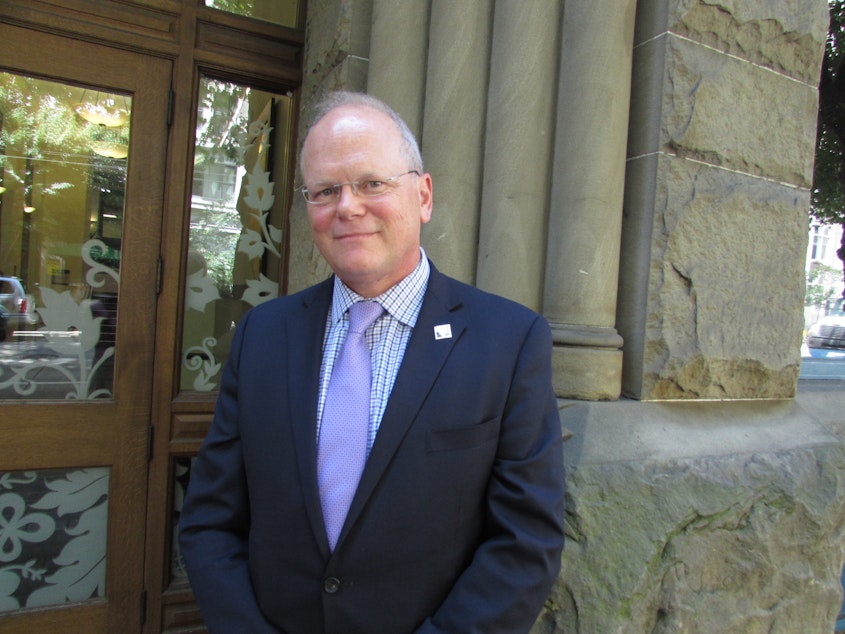King and Snohomish Counties quit prosecuting drug users. Now Snohomish has regrets

Last year both King and Snohomish Counties stopped prosecuting people for carrying small amounts of illegal drugs. But now the Snohomish County prosecutor said the experiment isn’t working.
“The current policy has been met with resistance throughout the community,” Snohomish County Prosecutor Adam Cornell said in a recent memo to county officials. He’s ready to reverse the policy.
The two counties were the first jurisdictions in the country to stop charging people for small amounts of heroin, methamphetamine and cocaine. Now their paths are diverging.
Snohomish County enacted its policy several months before King County, and has allowed drug users to avoid charges for up to two grams of controlled substances. (It’s double the amount of King County’s policy, which stopped prosecuting people for up to one gram.)
Cornell, who took office this year, said he doesn’t know why the Snohomish County policy change went further. “Two grams is just a very arbitrary amount, and it is a lot of drugs,” he said. “As a candidate for the Office of Prosecuting Attorney, and once I took office in January, I have heard from people in the Snohomish County community, from mayors and police chiefs, city council members, and just citizens that are disappointed that we’re not enforcing the law,” he said.
Cornell said he’s heard anecdotal evidence of users intentionally avoiding carrying more than two grams. “Word’s gotten out to folks in the community that my office is not enforcing the law,” he said. “That doesn’t sit well with people in the community and they want some kind of accountability. But they don’t want the accountability to take us back to the dark days of throwing people in jail or sending them to prison for the use and possession of small amounts of controlled substances.”
Cornell said he remains committed to alternatives to prosecution, including drug court and mental health court.“We have so many options for people who are interested in getting better,” he said. But he believes prosecutors need the leverage of bringing charges in some cases. “Without there being a possibility for adverse consequences, there’s not going to be an incentive for anybody to get better,” he said.
But King County Prosecutor Dan Satterberg said he believes the move away from prosecuting drug users for small amounts of drugs was the right one. “I wanted to build an alternative to prosecution,” he said. “Not just to step away from prosecuting, not to show indifference to the suffering that people are going through and the toll it takes on the neighborhood where drug users live. I’m not indifferent to that. I just want to build something that’s more effective.”
He said prosecution was expensive and not only didn’t help the defendants but disrupted any stability they had found. “At the end of almost a yearlong process which involves warrants and jail and many court appearances, we were spending about $3 million dollars a year in the King County court system prosecuting about 800 of these cases,” he said.
Satterberg put that $3 million towards expanding the LEAD program (Law Enforcement Assisted Diversion) which is getting ready to launch in Burien and other parts of South King County. Through that program, law enforcement officers and case workers connect drug users with housing and health services. “We’ve helped about 650 people and a lot of them continue to need help because they are chronically in need of services,” he said. “ All I am saying is, let’s give LEAD a chance, let’s expand it to the rest of the county,” a process expected to take about four years.
Satterberg said he also supports use of the county’s drug court, “but it’s full at 350 people. And the people that are willing to go through the rigors of drug court are, by and large, facing serious time in prison.” Drug court also requires participants to abstain from drug use, while he said LEAD can allow them to make steps gradually. Initial studies suggest LEAD participants have lower rates of recidivism and higher rates of housing and employment than nonparticipants.
Prosecutor Adam Cornell said when Snohomish County implemented the “2 gram rule” in February 2018, “there wasn’t an increase in our alternative justice program.” Now he said reversing the policy is contingent on more funding, for prosecutors as well as for diversion programs. “What I hope to do if I’m provided funding from the council -- if the policy is responsibly reversed -- is to expand people’s access to alternative justice programs and try to get people ... help to deal with their addiction in a way that’s compassionate but also provides accountability,” Cornell said.




